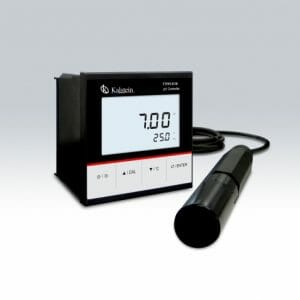pH is the unit of measurement that describes the degree of acidity or alkalinity and is measured on a scale that goes from 0 to 14. The measurement of pH (hydrogen potential) is one of the most important parameters in a laboratory, it has a great field of application such as: research, industry, teaching, among others. In laboratories where it is relevant to know the potential of hydrogen, a pH measurement equipment will always be found as a primary instrument. For the correct measurement of this parameter, it is necessary to select the optimal laboratory equipment, therefore it is very important to take into account the following aspects:
- Measurement equipment.
- Type and quantity of sample to be analyzed.
- Electrode selection.
- Reagents necessary for the calibration of the equipment (buffer solution).
What is a pH meter?
It is a scientific instrument that measures the activity of the hydrogen ion in aqueous solutions, indicating its degree of acidity or alkalinity expressed as pH. The pH meter measures the difference in electrical potential between a pH electrode and a reference electrode. This difference in electrical potential is related to the acidity or pH of the solution. The pH meter is used in many applications ranging from laboratory experimentation to quality control.
There are general maintenance techniques for pH meters, but in many cases each brand and each model has its own care. We will have to follow the instructions of the meter manufacturer to be able to enjoy it for a longer time.
What considerations should you keep in mind when measuring pH?
Initially it is very important to know that if reliable, reproducible, precise and exact measurements are required, first the appropriate laboratory material and equipment for pH measurements is required, such as pH meters.
As a second point, if a good sample is taken, representative, precise, exact and reliable measurements will be obtained in the same way; a sample taken incorrectly will produce unrepresentative, accurate, and unreliable measurements.
Later, to select the best electrode according to the type of sample, it is necessary to know their characteristics; There are glass body, epoxy body, refillable, non-refillable, micro-electrodes, bulb, flat tip, flow, among others. According to these characteristics, the selection of the electrode must be functional for the type of sample to be analyzed:
- For measurements where high precision is required, an electrode provides a fast response and is suitable for research-level applications.
- For samples such as culture media, TRIS solutions or that include proteins in their formulation, the ideal measuring device is one that includes a ROSS type electrode, since this electrode has a platinum reference and its filling solution does not include silver.
- For gels, creams, jams, with a high content of solids, the recommended measuring equipment is one that includes a flat tip electrode.
- For difficult paints and samples, the ideal option is an electrode where the flow of the filling solution ensures that solids do not accumulate in the joint preventing it from plugging.
- For samples with low solids content, transparent or clear liquids, low maintenance electrodes are a recommended option; they are also ideal for field measurements.
At Kalstein we are MANUFACTURERS and we offer you an excellent range of pH meters highly recognized for their reliability, precision, ease of use and excellent prices, which is why we invite you to take a look HERE


